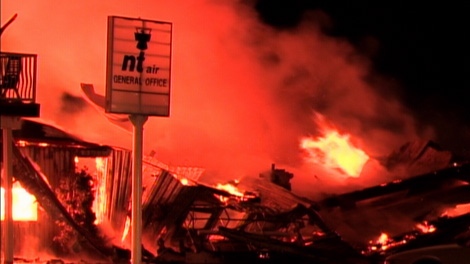A B.C. man who went missing nearly 15 years ago, while facing multiple sexual abuse allegations, has been declared dead by the court – which found he likely died when a fire engulfed the airplane hangar where he was last seen.
Last week, a judge determined that it was more likely than not that Vernon Martin died in the fire in Prince George on Dec. 19, 2009, making a declaration that will allow 16 life insurance policies valued at millions of dollars to be paid out.
Two days before Martin was last seen, he was confronted by members of his family with multiple allegations that “he had engaged in sexual misconduct with male members of the extended family, approximately 20 years before, when the family members were teenagers,” according to the B.C. Supreme Court decision.
His family members told the court that Martin “did not deny the allegations but attempted to explain and minimize them.” Martin also told his siblings that he had been sued by two of the men, and was in talks to settle the lawsuits.
The day Martin was last seen, he was visited by a long-term employee and the employee’s wife.
“They were extremely angry and confronted Vernon with allegations that he had engaged in sexual misconduct with their son when he was a teenager. They threatened to call the police and have him arrested. The couple’s son, now an adult, wanted to have a meeting with Vernon that evening,” the court decision says.
Soon after, Martin left his sister’s home, where he was staying, to go to the hangar. One hour later, firefighters were dispatched to the building. A witness saw Martin enter the building, and no one saw him leave.

The cause and origin of the fire were never determined but the building was destroyed.
“Very little of the building is not burned in some way,” a report from the RCMP on the day after the fire, quoted in the decision, said. “The scene is a large pile of still burning, dangerous debris quickly being covered with ice and snow.”
Martin’s body was never found but the court was persuaded by expert evidence that the nature and extent of the damage done by the fire, as well as the impact of firefighting efforts on the scene could have resulted in his charred remains being “dispersed throughout the debris field.”
A search of Martin’s car found his briefcase inside, containing all of his credit cards and ID and his wedding ring. A fireproof safe recovered from the office in the hangar found a note attached to Martin’s most recent will – dated three days before he disappeared.
“I don’t know how to say ‘IM SORRY’ strong enough for what I have done to you all. I hope you can find it in your heart somewhere to forgive me. I do not want a funeral of any kind. Please just have me cremated and throw away my ashes,” the letter said, in part.
“I’m a really bad person. I don’t really know why I did what I did. I can’t give a straight [?] answer. I start with good intentions but I carry everything way to far. Please forgive me if you can.”
The court considered whether Martin could have staged his own disappearance, but found no evidence that he had fled town, no activity on his credit cards or bank accounts, and no indication he had enough money stashed to survive or a plan to start a new life under an assumed identity.
“I accept that there was some motive on Vernon’s part to disappear in light of the disclosure of the historical sexual misconduct allegations,” the judge wrote.
“Clearly, the disclosures made to his family caused him distress. However, rather than setting up his own disappearance, more persuasive is the letter found in the fire-proof safe in the Hangar debris field which supports that Vernon did not want to disappear but wanted to end his life.”
The judge noted that the law does not require the court to determine how a person died, only that it is satisfied that a death occurred, on a balance of probabilities.
Martin was not charged criminally prior to his disappearance, but he was charged in Alberta with two counts of indecent assault and two counts of gross indecency in 2010.





